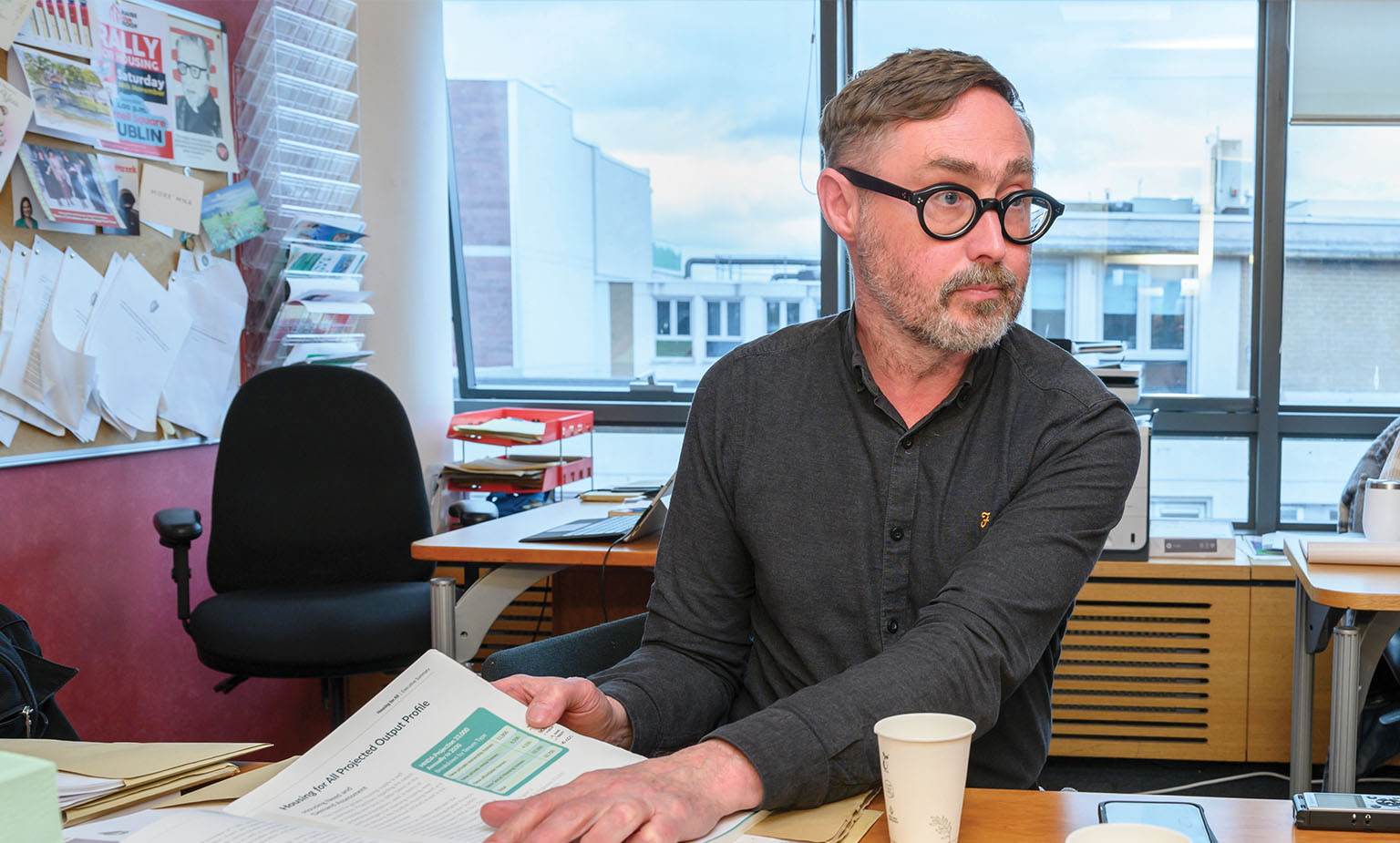Sinn Féin publishes first element of alternative housing plan

As part of its efforts to reorientate the public discourse back towards the ongoing housing crisis well ahead of the coming general election, Sinn Féin published the affordable housing element ahead of its long-awaited “comprehensive” alternative plan for housing. Ciarán Galway writes.
In recent years, both in the Dáil and in the media, Sinn Féin had been consistently challenged to publish its alternative housing plan. Indeed, speaking with the Housing Ireland Magazine in summer 2024, Housing Minister Darragh O’Brien TD observed: “He [Eoin Ó Broin] told the Sunday Independent 16 months ago that he was just about to publish it, and he has not.”
Also speaking with Housing Ireland Magazine at that time, Sinn Féin housing spokesperson, Teachta Eoin Ó Broin, was unperturbed by the absence of his party’s plan from the public sphere, and the associated criticism that this attracted. “I like to remind people that [Minister] Darragh O’Brien had no housing policy when he was an opposition – not a single piece of paper – and it took him a full year as Minister for Housing before he launched his plan,” he retorted, adding that it would be published “well in advance of the general election” which is anticipated to arrive in the late autumn.
Partially fulfilling his word, Ó Broin’s party has published the first element of this plan: Sinn Féin Affordable Homes Plan: Bringing Home Ownership Back into Reach for Working People. While this initial publication focuses on affordable homeownership, Sinn Féin’s “comprehensive housing plan”, Ó Broin says, will be launched in September 2024.
“We were holding off until we got The Housing Commission’s report and some other information from government that is important. If we are going to map out a five-year plan, we want it to be fully costed; something which even the Government’s own housing plan is not,” he explains.
In his time as opposition housing spokesperson, Ó Broin has produced several detailed housing policy documents. Asked to explain how Sinn Féin’s communication of housing policy has evolved, he responds that increasingly, “it is all about much more detailed propositions”, and about “how we can deliver”.
“What the next 12 months are going to be about is a debate about two housing plans – the Government’s and ours – and who has the most credible set of propositions for delivering those plans,” he assesses.
That being said, in a policy area which is becoming increasingly complex amid a myriad of schemes aimed at housing delivery, Sinn Féin Affordable Homes Plan is a comparably short document that utilises relatively plain language.

Tactfully placing emphasis on “working people”, including in its cover, the alternative plan is very much the product of the left-wing of the Sinn Féin, as personified by Ó Broin (among others) – the author of Sinn Féin and the Politics of Left Republicanism – a text which defines contemporary party in terms of ‘left republicanism’.
Affordable leasehold purchase scheme
In a lengthy interview with the Housing Ireland Magazine, Ó Broin outlined his critique of government housing policy and articulated a solution that is fundamental to his overall alternative housing plan; an affordable leasehold purchase scheme.
While acknowledging the role of housing benefit as a short-term necessity, he called for a “controlled unwinding” of the reliance on rental subsidies (such as Housing Assistance Payment and the Rental Accommodation Scheme) as a form of long-term support via the introduction of affordable leasehold purchase.
“With respect to tenant purchase, it has real value,” he says, elaborating: “The problem is when the properties are sold into the rental sector or the private for-profit market. We have long argued that we [a Sinn Féin government] will continue tenant purchase, but we will not sell the land.
“Instead, we will give you free, indefinite use of the land through a legally binding covenant for you, your children, and your grandchildren. However, if you want to sell, you will have to sell back to the local authority at the discounted price index-linked for inflation.
“That way you get the benefits of tenant purchase – an income mix within working class communities and intergenerational security of tenure – which are really valuable things, while never losing the stock to the private sector.”
Critique
However, the proposed affordable leasehold purchase scheme is a lightning rod for criticism. Speaking with the Housing Ireland Magazine, Minister for Housing Darragh O’Brien TD referenced the proposal as “a Cuban style model of housing that they [Sinn Féin] want[s] to bring in”. Latterly, he has sardonically referred to it as a “home leasing scheme”.
Responding to a suggestion that his political rivals have portrayed and will continue to portray the scheme in a manner that implies that people will not own their own homes, Ó Broin is undeterred. “The interesting thing, of course, is that under the Government’s Help to Buy scheme, you do not own your home because they own €100,000 worth of equity in it,” he responds, continuing: “I have conversations with people all around the country about this. The overwhelming majority of people want to buy a home for them, their children, and their grandchildren, at a price they can afford. They are not, in the first instance, buying it and thinking of the windfall gains in 20 years.
“Our scheme allows them to do it; they own the home. The bricks and mortar are theirs, but the land is the State’s, as is the cost of site servicing. Whether you buy an affordable home or you acquire your tenant purchase home, that property is yours and you have all the same rights as any other owner. The only difference is that the State owns the land.”
Government response
Following its publication, Minister of Housing, Local Government and Heritage Darragh O’Brien TD was less than impressed by Sinn Féin’s alternative affordable housing policy. “Four years for a 14-page document,” he derisively posted on X, adding: “Can’t confirm banks will lend on their proposals. Say they will ‘consult’ with lenders. Restrictions on sale of homes in future. This is not home ownership.”
Furthermore, the Minister posed a series of 10 questions “which Sinn Féin must answer”. Most crucially, these include:
- “will they finally answer the many questions in relation to their ‘affordable leasehold purchase scheme’… and can they give an estimate as to how long it will take to establish this scheme?”; and
- “can they confirm that commercial banks have indicated positively to them that they will lend on the affordable leasehold purchase scheme arrangement?”
Mortgage finance
Mortgage finance, the Sinn Féin housing plan indicates, “would be accessed under the existing rules from commercial mortgage providers, credit unions or local authority mortgages, the details of which would be provided following consultation with these lenders.”
Indeed, Ó Broin has indicated that, through his party’s engagement with the Banking and Payments Federation Ireland (BPFI), mortgage finance options under the affordable leasehold purchase scheme have been outlined by the representative body.
Subsquently, on 21 August 2024, in a letter addressed to Brian Hayes, Chief Executive, BPFI, the Housing Minister called for “openness and transparency” around Sinn Féin’s future engagement with the banks and wrote: “I understand that banks have not been able to guarantee that they will lend mortgages under this new proposed scheme, generating major concerns and uncertainty.”
Ultimately, the Minister is gambling on the public torpedoing of Sinn Féin’s proposal by the banks through their representative body. For an organisation that is, in O’Brien’s words, “independent, apolitical and non-political nature”, this is a particularly uncomfortable position in which to be placed.
Set to be published in September 2024, BPFI’s “detailed proposal” on Sinn Féin’s alternative plan – including any challenges relating to mortgageability that are identified – is now highly anticipated.

General election
In an interview with eolas Magazine in late 2023, Sinn Féin’s Matt Carthy TD suggested: “Some of the challenges are so big… that, of course, it will take more than a five-year term in government. I also think, to be quite frank about it, if we do not solve housing in one term of government, we will not get a second.”
Asked if he agreed with his colleague’s assessment and whether it was realistic that a challenge such as the housing crisis could be solved in a single term of government, Ó Broin insists that his party “must be very upfront with people” across all the portfolios.
“We have to set out very clearly to people what is deliverable year-on-year, what is deliverable over a full term, and what we would seek to deliver if we got a second term,” he says.
In housing specifically, he details his projected timelines for Sinn Féin’s alternative plan to take effect. “Within six months we could start to get the homelessness numbers down. We could start ramping up the delivery of social and affordable homes very significantly by year two, and then exponentially by years four and five.
“Very significant reform of the Residential Tenancies Act 2004 and changes to rent regulation could be done immediately, so that people would see our intentions.
“Within five years we could achieve a hell of a lot that would set us up to go back to the public and say: ‘Look at what we have done over the last five years, let us finish the job’,” he concludes.





